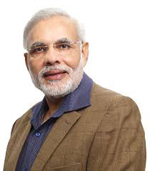For anyone who's ever tried to do business in India, you know it takes 50 memos, dozens of approvals (and often divine intervention) to get anything done.
 |
| Indian Prime Minister Narendra Modi |
Prime Minister Narendra Modi has been trying to change that perception with his "Make in India" campaign to attract foreign investment. But the reality at home was thrown into sharp relief with the news recently that a project to make heart valves in an Indian special economic zone (SEZ) was being stymied because of "pending approvals, delayed clearances and lack of financing options," according to a report by the Economic Times.
Indians are spending millions on imported heart valves, and many patients are dying because they simply cannot afford the costs. Officials believe that domestically produced valves would save thousands of patients and would vault Indian into a small league of countries that make the valves. The others are Brazil and the United States.
The solution was the development of Frontier Mediville, India's first SEZ for research in basic medical sciences and the creation of cardiac surgeon Dr. K. M. Cherian. He started the venture in 2008 outside of Chennai and it was given official SEZ status for the biotechnology sector by the commerce ministry in March 2009, according to the report. Cherian wanted to use the facility to produce the valves in collaboration with the Georgia Institute of Technology and with prototypes developed at the Global Center for Medical Innovation in the U.S.
The project, however, has been far from easy. Approval for the use of animals in research has been held up and was originally sought in 2013, the process for approval to conduct phase II clinical trials from the Drug Controller General of India started in September 2010 and was finally completed in 2014 while the approval for phase III trials remains elusive.
"In Singapore it takes 12 days and it takes a month in Japan. In comparison, in India it takes years, with no clear reasons given. This is why biotech companies and R&D facilities are locating elsewhere," Cherian told the Economic Times.
The delays in approvals have cost the project time and money and put the future of the facility in danger. The facility has had to restructure its loans, but Cherian says it remains in "crisis," the report said.
Cherian said in the report that he has spoken to Modi about the problems and said the prime minister assured him they would be solved, "but I wonder if he realises how out of sync the bureaucracy and regulatory bodies are with his vision. Plus, there has to be a radical change in the way R&D is viewed by the financial system," he said in the report.
- here's the report from the Economic Times